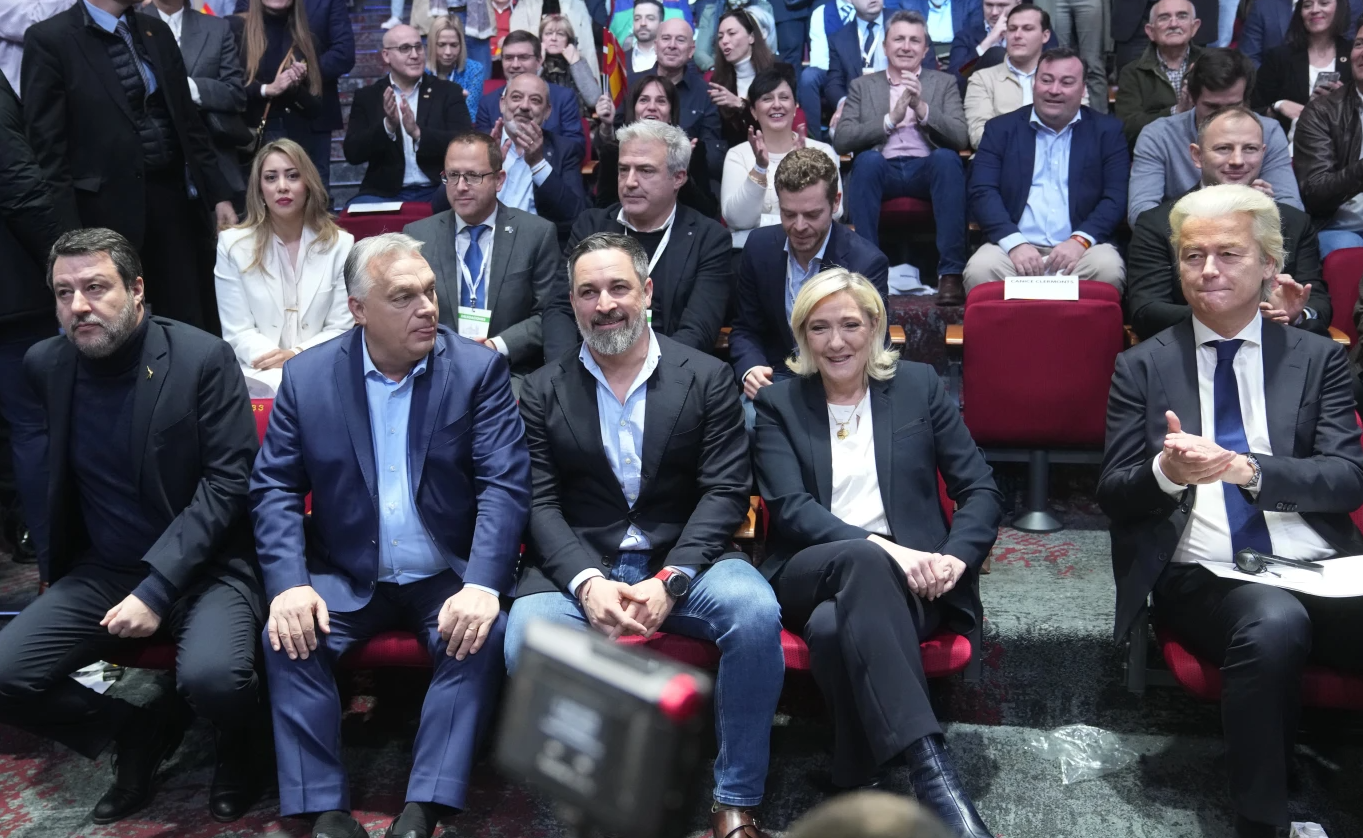The European establishment has ramped up its efforts to counter far-right forces, a move that will profoundly shape transatlantic relations in the Trump 2.0 era.

From left, Italy's Vice Premier Matteo Salvini, Hungarian Prime Minister Viktor Orban, far-right VOX party leader Santiago Abascal, French far-right leader Marine Le Pen and Dutch far right wing politician Geert Wilders attend Spanish far-right party VOX rally, February 8, 2025. (Photo: Paul White/AP)
Donald Trump 2.0 has breathed new life into the political right wing globally, catalyzing a movement anchored by so-called conservatives in the United States. In response, Europe and other regions have redoubled their efforts to push back. They want to safeguard their political stability and protect their systems of governance from the rising far-right tide while also taking on the challenges of ideological realignments and what they see as foreign interference.
The recent presidential and parliamentary elections in Poland, Romania and Portugal are the latest indicators of Europe’s political trajectory, following the German federal election in February.
Faced with resistance, far-right movements in Europe have worked to expand their influence. In Romania, establishment candidate, Nicusor Dan defeated far-right contender George Simion. In Poland, the ruling Civic Coalition’s presidential candidate, Rafal Trzaskowski, led the first round of the presidential election, while the once-favored far-right candidate Slawomir Mentzen was out of the picture. These results highlight Europe’s firm pushback and countermeasures against the rise of far-right forces and the trend of U.S.-Europe far-right convergence.
Currently, American right-wing conservatives are aggressively shaping the global movement more openly than ever before — even more so than during Trump’s first term. They are leveraging Europe and Latin America to accelerate their brand of conservatism, in two key ways:
First, the United States is becoming a global hub for the political right wing. Italy’s Prime Minister Giorgia Meloni and Argentina’s President Javier Milei attended Trump’s inauguration to show solidarity and amplify their influence. In February, the U.S. Conservative Political Action Conference, or CPAC, became a rallying point at which European and Latin American far-right leaders embraced the “Make America Great Again” (MAGA) ideology. Le Monde called it a “pilgrimage” for European nationalists, and Poland’s Law and Justice Party is planning a European version of CPAC in May.
Second, American conservatives, especially the “tech right,” are becoming more brazen in their interference in other countries’ politics. U.S. Vice President JD Vance’s speech at the Munich Security Conference was a clear declaration of war by U.S. conservatives against the European establishment. Elon Musk, the face of the “tech right,” routinely uses his online posts to support far-right parties in Germany and Romania. European far-right figures, in turn, are happy to leverage American conservative support for their agendas. For example, Musk’s pre-election conversation with Alice Weidel, the AfD’s leader in Germany, translated into a campaign boost for the party. Romania’s Unity Alliance Party chairman George Simion not only attended CPAC but also invited Musk to Romania for a “debate on democracy.”
The far-right movement in the U.S. and Europe is posing an escalating threat to traditional Western political values embraced by the European establishment. The contest over defining “democracy” is intensifying. The far-right argues that “votes determine reality” in seeking support for far-right or authoritarian leaders as a means to implement anti-immigration and nationalist agendas. These are people willing to use mass movements, online sentiment and extreme rhetoric to gain influence.
In contrast, the European establishment insists that Western democracy should be grounded in the norms of the “liberal order.” Political parties must align with accepted “correctness” on key issues to convert votes into influence. This idea reflects Europe’s historical sensitivity to the emergence of Nazi fascism in the wake of popular support. Europe is aware of the need to set boundaries for “vote-based politics” to set up a firewall against extreme ideologies.
To the European establishment, the far-right in the U.S. and Europe are increasingly challenging traditional Western political values, and the contest to define “democracy” is growing more intense.
Moreover, the U.S. and Europe diverge on the concept of “freedom.” American conservatives champion “absolute freedom,” advocating for minimal regulation and unrestricted free speech. However, in practice, the U.S. government has shown authoritarian tendencies, with policies increasingly reflecting Trump’s personal will and exacerbating conflicts with the legislative and judicial branches. European countries, by contrast, frame “freedom” within the EU’s core values. They are increasingly wary of the growing similarities between the U.S. under Trump and countries like Hungary under Viktor Orban, as well as Italy and Slovakia, which are adopting similar political styles.
Against this backdrop, the European establishment is increasingly resorting to “non-liberal” measures to curb far-right political activities, as well as direct confrontation. France’s judiciary constructed a “misuse of funds” case to disqualify Marine Le Pen from the 2027 presidential race. Germany’s security authorities have labeled the AfD as “extremists.” Romania’s Constitutional Court declared an election invalid in December. Moreover, the establishment is leveraging public concerns over “foreign interference” to play the patriotism card.
During Romania’s presidential election, allegations of Russian interference and of far-right candidates’ ties to Russia became pivotal factors. As European wariness of the U.S. grows as a result of issues such as “reciprocal tariffs” and U.S.-Russia relations, the far-right’s claims of solidarity with Trump may backfire amid rising anti-Trump sentiment.
This pushback against the far-right will profoundly shape transatlantic interactions during Trump’s second term. Postwar transatlantic relations — built on politics, economy, security and shared values — are now under strain on all fronts. Divergences over political, economic and security concerns are worrying enough without shared values being under attack. Trust and policy coordination will further weaken, and both sides will engage in coercion and negotiations to define interests. Europe will also become more vigilant against the prevailing American political ideology.
